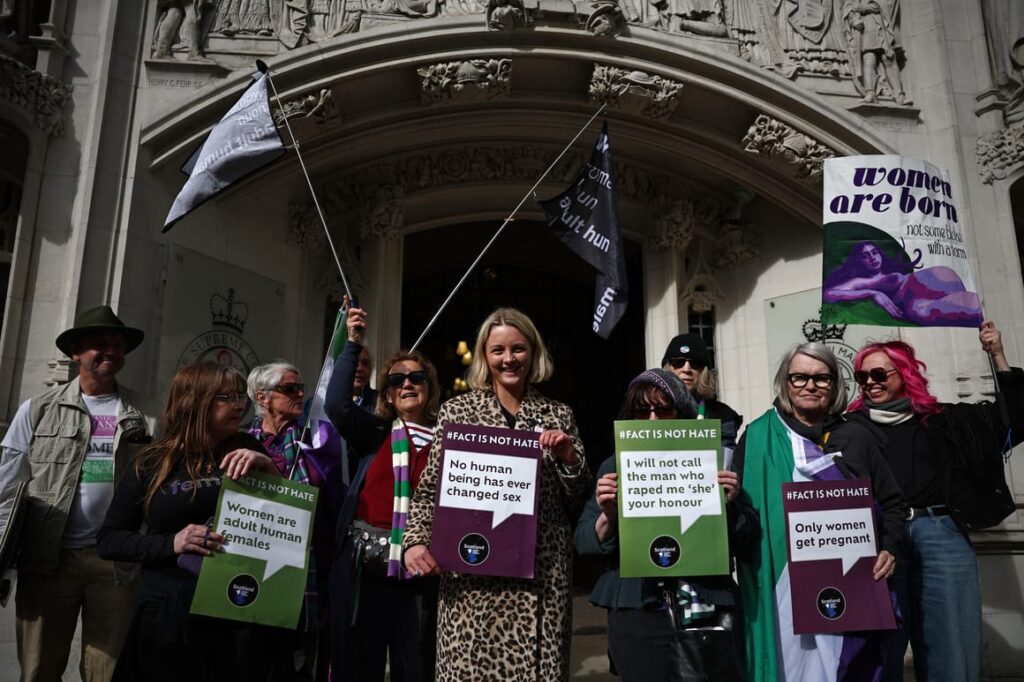The Supreme Court has delivered a unanimous decision that the terms ‘man’ and ‘woman’ in UK equality legislation refer to biological sex, as understood in ordinary language. This interpretation is based on an 87-page judgment that found including trans men or women with a Gender Recognition Certificate would not be feasible in statutory interpretation and would lead to incoherent definitions.
The implications of this decision are far-reaching, affecting public service providers, employers, charities, and associations.
For instance, the definition of ‘women-only’ spaces such as changing rooms or charities established to serve women or girls will now be based on a biological definition of ‘woman’, excluding transgender men or women with a GRC.Lord Hodge, one of the five justices, acknowledged the competing rights involved in this case, including those of women, the transgender community, and lesbian women.
He cautioned against interpreting the judgment as a victory for one group over another, emphasizing that the transgender community is separately protected under the Equality Act 2010.The case was brought to the Supreme Court following the Scottish Government’s issuance of statutory guidance on ‘positive action’ legislation regarding gender representation on public body boards. The guidance had included those certified with a Gender Recognition Certificate in the definitions of ‘woman’ and ‘man’.
For Women Scotland, the organization that initiated the case, argued against this inclusion,主张 UK’s Equality Act 2010 was drafted with the ordinary biological meaning of ‘woman’ and ‘man’ in mind, and should not extend to include trans women or men with a GRC. The Supreme Court has agreed with this stance.For Women Scotland stated in a release: ‘The Supreme Court has confirmed what women across the country already knew.
Sex matters … This ruling restores legal clarity and reaffirms the purpose of the protections written into the Equality Act. This win protects all women, including trans-identifying females, by ensuring maternity rights, women-only spaces, and female-focused services are grounded in reality.’The complex legal analysis within the 268 paragraphs of the judgment, authored by three of the five justices, Lady Rose, Lady Simler, and Lord Hodge, offers long-term clarity for businesses, according to equality legal experts.
A Scottish government spokesperson mentioned: ‘We will be engaging with the UK Government to understand the full implications of this ruling … and we will engage with the Equality and Human Rights Commission as a matter of urgency on the need to review its guidance considering this judgment.’
Phillip Pepper, an employment partner at the law firm Shakespeare Martineau, has reassured everyone that the Scottish Government is fully committed to protecting everyone’s rights, ensuring Scotland remains an inclusive country.
While this decision may be disappointing for some, Pepper states that it ultimately offers a clear path forward for employers. Employers can now ensure they stay on the right side of the law.
This decision implies that separate spaces may need to be created for the trans community. Businesses may have to rethink their policy towards single-sex spaces in the workplace, such as bathrooms and changing rooms. They must ensure that all individuals have a suitable space that they feel comfortable in when needing to use those facilities. As Pepper makes clear, these practical applications are now matters for service providers and employers. The judges have done their part. Lord Hodge emphasized that the Supreme Court’s task was not to make policy on how groups should be protected, but only to ascertain the meaning of the legislation.

